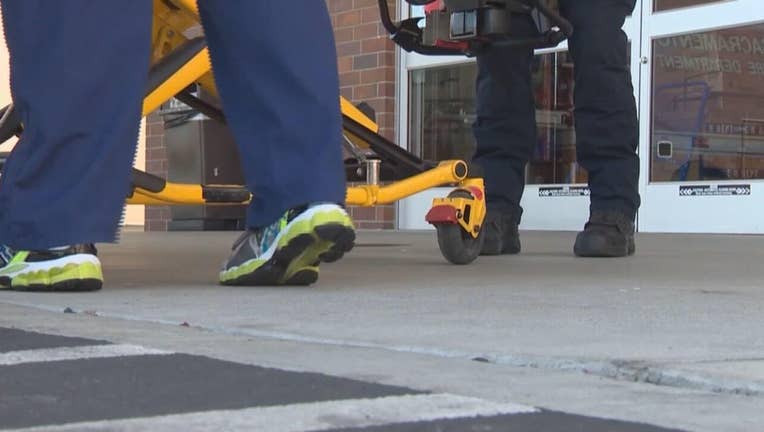Kaiser Permanente healthcare workers protest for more support, pay during pandemic

FILE ART - Kaiser San Leandro
OAKLAND, Calif. - Healthcare workers at 29 Kaiser Permanente facilities across California are scheduled to hold protests demanding recognition and additional support during the pandemic, weeks after the medical system slashed performance sharing bonuses, despite posting $6.4 billion in profits during the last year.
SEIU-United Healthcare Workers West hosted a picket Wednesday at the Oakland medical center. Protests will continue throughout March and April at various locations statewide.
"There's a disconnect between the thinking of Kaiser executives and the experience of frontline workers," Kaiser Vacaville nurse Donna Norton said in a statement. "Workplace exposures have kept us home, as has the traumatic toll of working through this pandemic. So many caregivers have been physically exhausted from taking on extra shifts week after week and are mentally worn down. We need extra support from our employer right now, not less."
In a statement, Arlene Peasnall, Kaiser's senior vice president of Human Resources, said over the past year, Kaiser provided $375 million in employee assistance to ensure that frontline employees had access to alternate housing options, special childcare grants, and two full weeks of additional paid leave for COVID-19 illness and exposure.
She also said that union employees have received step wage increases and guaranteed annual wage increases.
Late last fall, she said that labor and management leaders recognized that year-end performance bonus programs for union-represented employees could be a challenge to achieve in the pandemic. In the end, Kaiser chose to guarantee all eligible, union employees a minimum of a 100% payout of their performance sharing bonus payment.
She said that 160,000 labor-represented employees received at least a full payout of their performance or appreciation bonus this year. That means, that for more than 58,000 SEIU-UHW licensed vocational nurses, medical assistants, ambulatory and environmental services staff at Kaiser Permanente, the bonus payouts ranged from $1,800 to $3,500 per employee. In all, Peasnall said that more than $130 million in performance-sharing program bonus payments were paid out.
She stressed that the agreement came as a result of negotiating with the union.
"We are deeply appreciative of the extraordinary commitment and dedication of all Kaiser Permanente employees throughout our response to the pandemic," Peasnall said. "Especially those who have been serving on the front-line fight of this deadly virus."
And serving on the front lines has taken its toll. Employees at Kaiser Permanente said they are burned out and they want their employer to pay people more to stay.
Kaiser Downey Emergency Room Technician Gabriel Montoya, who got sick with COVID-19 earlier in the year in an exposure he believes happened at work, said he is upset that Kaiser is not filling open positions and limits the distribution of masks and other PPE.
"We’ve gotten exposed and sick from COVID because we came to work," Montoya said. "Some workers were hospitalized and even died. And for that, they’re going to cut our bonus? It’s unbelievable."
One of the biggest coronavirus outbreaks occurred at the San Jose Kaiser on Christmas when it is believed that a well-intentioned but infected employee dressed up in an inflatable tree costume and spread the virus inadvertently throughout the emergency department.
That caused dozens of positive cases among staff and patients at the hospital, and one worker, a receptionist, died a week or so after Christmas, although Kaiser hasn’t said exactly when.
KTVU has not been able to identify that person because the Santa Clara County coroner can't ID people if they don't know the exact day or location that someone died.
Cal-OSHA has fined at least 12 Kaiser Permanente facilities in California since the outbreak began for a series of alleged coronavirus safety protocol violations.
Kaiser is appealing these citations, which they said stem mainly from allegations earlier in the pandemic, as health care systems "grappled with national shortages and evolving public health guidance."
A Kaiser spokesman also said that some advocacy groups undertook efforts to file OSHA complaints as part of their campaign to advocate for change in the then-current regulatory guidance – and filing complaints against Kaiser Permanente "provided high visibility for these efforts."
RELATED:
- Kaiser Walnut Creek the latest facility to be cited by state agency for COVID violations
- San Leandro Kaiser hit with fresh fines; KP comprises 10% of California COVID citations
- San Jose Kaiser at center of Christmas Day coronavirus outbreak among California's top COVID violators
- Patient contradicts Kaiser’s claim that everyone was notified of Christmas COVID outbreak
- Official tally of Kaiser San Jose Christmas coronavirus outbreak nears 100 cases

